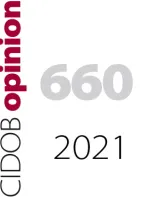Jean Monnet Atlantic Network 2.0
This project analyses interregional relations in the Atlantic Basin, a crucial setting for globalisation and a microcosm of key global trends.

The Jean Monnet Atlantic Network 2.0 continues a six-year research project into the Atlantic Basin as a crucial setting for globalisation and a microcosm of key global trends.
The EU’s increasingly strong interdependencies with its partners in the Atlantic and growing transnational risks resulting from the US–China rivalry in the region, as well as moves by other destabilising actors, make a strategic counterweight in the form of a third power like the EU necessary.
Using the experience acquired from participating in two previous projects – Atlantic Future (financed by FP7 2013–2016 and coordinated by CIDOB, Spain) and the Jean Monnet Network of Atlantic Studies (2017–2019 coordinated by the Fundación Getulio Vargas in Rio de Janeiro) – this project proposes a network of six members who will maintain close communication and hold joint activities. The main feature of this proposal are the six meetings that will be held with all the network’s representatives, which will address three topics.
Energy and sustainability: The network will draw on experience from across the Atlantic space to explore mutual interaction, the effects of fluctuations in prices and supply and demand, environmental impacts and trends, climate change issues and related developments in maritime trade. The same applies to efforts to address energy poverty and distributional inequalities. Meanwhile, the extent to which these dynamics shape and affect the emergence of an Atlantic area, including the implications for the EU as an Atlantic actor, will not be neglected.
Trade and related economic activities: Analysis will be made of the broader effects on the Atlantic of US–China economic negotiations and conflicts, Asian economic engagement within the Atlantic hemisphere and how it is changing trade and investment patterns and other general economic linkages, and the supposedly correlated reorientation of value and supply chains.
Inequality: The interaction between human security problems and the numerous arteries that connect the EU to its Atlantic partners in the region and their patterns of inequality is another key issue we intend to analyse. This will help to frame security policies within a modern context with the EU as an Atlantic actor, to share best practices from effective EU and other regional governance mechanisms on issues including democratic values and drug trafficking, and to explore principles and codes of conduct that can usefully inform new pan-Atlantic attitudes towards dealing with such challenges.

Coordinator:
Fundação Getulio Vargas (FGV IIU) International Intelligence Unit
Partners:
- Universidad Nova de Lisboa – Instituto Português de Relações Internacionais (IPRI-UNL)
- Barcelona Centre for International Affairs (CIDOB)
- Centro de Investigación y Docencia Económicas (CIDE)
- Policy Center for the New South (PCNS)
- Institut d’Études Européennes, Université Libre de Bruxelles (ULB)
Researchers involved in the project:
Eva GARCIA CHUECA


